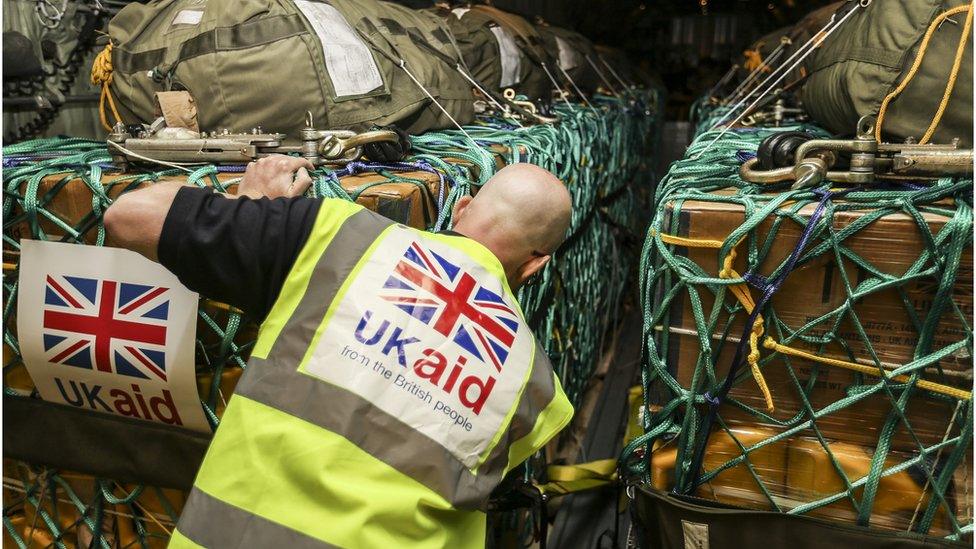Government set to breach foreign aid spending cap
- Published

The government is set to breach its cap on foreign aid spending because so much of the budget is being used to pay for asylum seekers in the UK.
Spending is currently set at 0.5% of national income - around £11bn.
The BBC has learned that Chancellor Jeremy Hunt is expected to admit there will be an overspend of £1bn or so in each of the next three years pushing aid spending to an estimated 0.55%.
The Treasury said there were "significant pressures" on aid budgets.
The department, responsible for the country's finances, has been forced to accept the increase because the Home Office has spent so much of the foreign aid budget housing and feeding refugees and asylum seekers from Ukraine, Afghanistan and others coming in boats across the Channel.
The BBC revealed last month the government was on course to spend £4bn of aid in the UK this year, more than on direct humanitarian help for countries overseas.
International rules allow governments to count the money they spend on the first year of an asylum seeker's stay in their country as official development assistance - known as ODA. But such have been the numbers coming into the UK this year that the Home Office's drain on the aid budget has risen inexorably.
As a result, earlier in the summer the Foreign Office suspended all "non-essential" spending on humanitarian and development needs overseas, causing devastating cuts to UK aid projects all over the world.
This was on top of the government's decision two years ago to cut its aid spending target from 0.7% of national income to 0.5%. The reduction was supposed to be temporary and last only until "the fiscal situation allowed" - which the Treasury last year forecast would be in 2024.
But government sources suggest Jeremy Hunt will make clear this Thursday when he announced the Autumn Statement that there will be no return to the 0.7% target for at least three years. Nor is there expected to be any curb on Home Office use of the aid budget.
Even though aid spending overseas is falling, any overall increase in the budget may prove controversial in a week when so much other government spending is expected to be cut by the Chancellor.
Charities said officials in the Foreign Office had not realised how much aid was being spent by the Home Office and had not had enough time to cut other budgets to meet the 0.5% target. "Officials just don't know what their budget is going to be," one source said. "It is very, very difficult to plan."
It is also understood that The Treasury that Andrew Mitchell, the new International Development Secretary, has successfully persuaded the Treasury to protect some aid spending targeted at preventing treatable diseases.
Mr Mitchell is expected to announce on Monday just how much money the UK will contribute over the next three years to the Global Fund - the international organisation that tackles tuberculosis, HIV/Aids and malaria. Charities are hoping he will allocate at least £1bn. Three years ago the government pledged £1.4bn for that three-year period.
The Treasury emphasised that the government was prioritising essential overseas aid funding and remained committed to spending 0.7% of national income on ODA once the fiscal situation allowed.
In a statement, it said: "Across government, there are significant pressures on the ODA budget due to the costs of accepting refugees from Afghanistan and Ukraine as well as wider migration challenges. We remain one of the largest global aid donors, spending more than £11bn in aid in 2021, and UK aid has recently gone towards those in need in the Horn of Africa and Pakistan.
"All spending decisions will be considered in the round by the Chancellor at the Autumn Statement."
- Published28 October 2022

- Published22 July 2022
